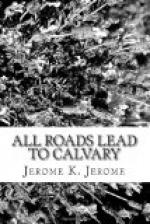It was the first time he had risen since his appointment, and he was received with general cheers. He stood out curiously youthful against the background of grey-haired and bald-headed men behind him; and there was youth also in his clear, ringing voice that not even the vault-like atmosphere of that shadowless chamber could altogether rob of its vitality. He spoke simply and good-humouredly, without any attempt at rhetoric, relying chiefly upon a crescendo of telling facts that gradually, as he proceeded, roused the House to that tense stillness that comes to it when it begins to think.
“A distinctly dangerous man,” Joan overheard a little old lady behind her comment to a friend. “If I didn’t hate him, I should like him.”
He met her in the corridor, and they walked up and down and talked, too absorbed to be aware of the curious eyes that were turned upon them. Joan gave him Carleton’s message.
“It was clever of him to make use of you,” he said. “If he’d sent it through anybody else, I’d have published it.”
“You don’t think it even worth considering?” suggested Joan.
“Protection?” he flashed out scornfully. “Yes, I’ve heard of that. I’ve listened, as a boy, while the old men told of it to one another, in thin, piping voices, round the fireside; how the labourers were flung eight-and-sixpence a week to die on, and the men starved in the towns; while the farmers kept their hunters, and got drunk each night on fine old crusted port. Do you know what their toast was in the big hotels on market day, with the windows open to the street: ‘To a long war and a bloody one.’ It would be their toast to-morrow, if they had their way. Does he think I am going to be a party to the putting of the people’s neck again under their pitiless yoke?”
“But the people are more powerful now,” argued Joan. “If the farmer demanded higher prices, they could demand higher wages.”
“They would never overtake the farmer,” he answered, with a laugh. “And the last word would always be with him. I am out to get rid of the landlords,” he continued, “not to establish them as the permanent rulers of the country, as they are in Germany. The people are more powerful—just a little, because they are no longer dependent on the land. They can say to the farmer, ’All right, my son, if that’s your figure, I’m going to the shop next door—to South America, to Canada, to Russia.’ It isn’t a satisfactory solution. I want to see England happy and healthy before I bother about the Argentine. It drives our men into the slums when they might be living fine lives in God’s fresh air. In the case of war it might be disastrous. There, I agree with him. We must be able to shut our door without fear of having to open it ourselves to ask for bread. How would Protection accomplish that? Did he tell you?”
“Don’t eat me,” laughed Joan. “I haven’t been sent to you as a missionary. I’m only a humble messenger. I suppose the argument is that, good profits assured to him, the farmer would bustle up and produce more.”




